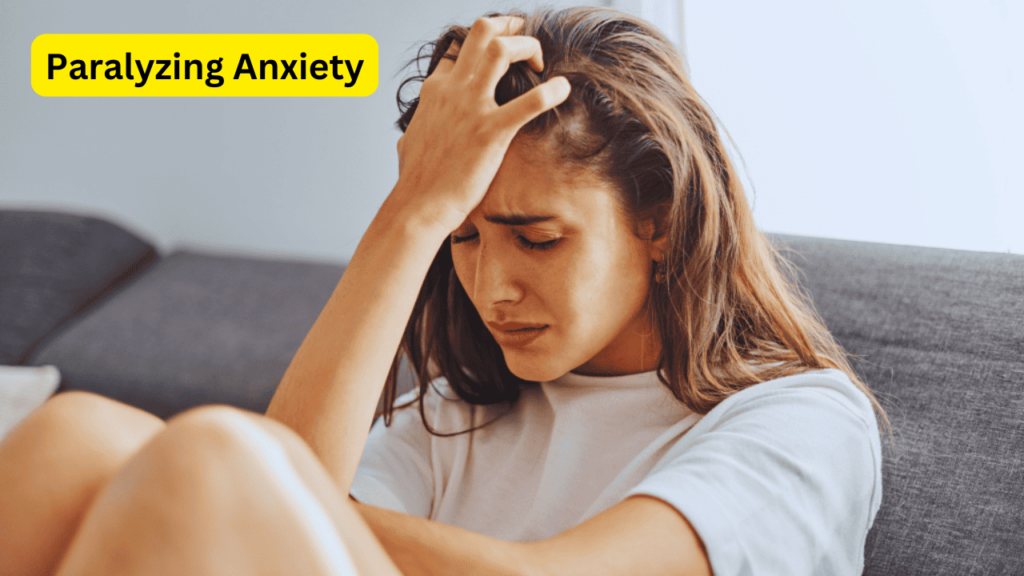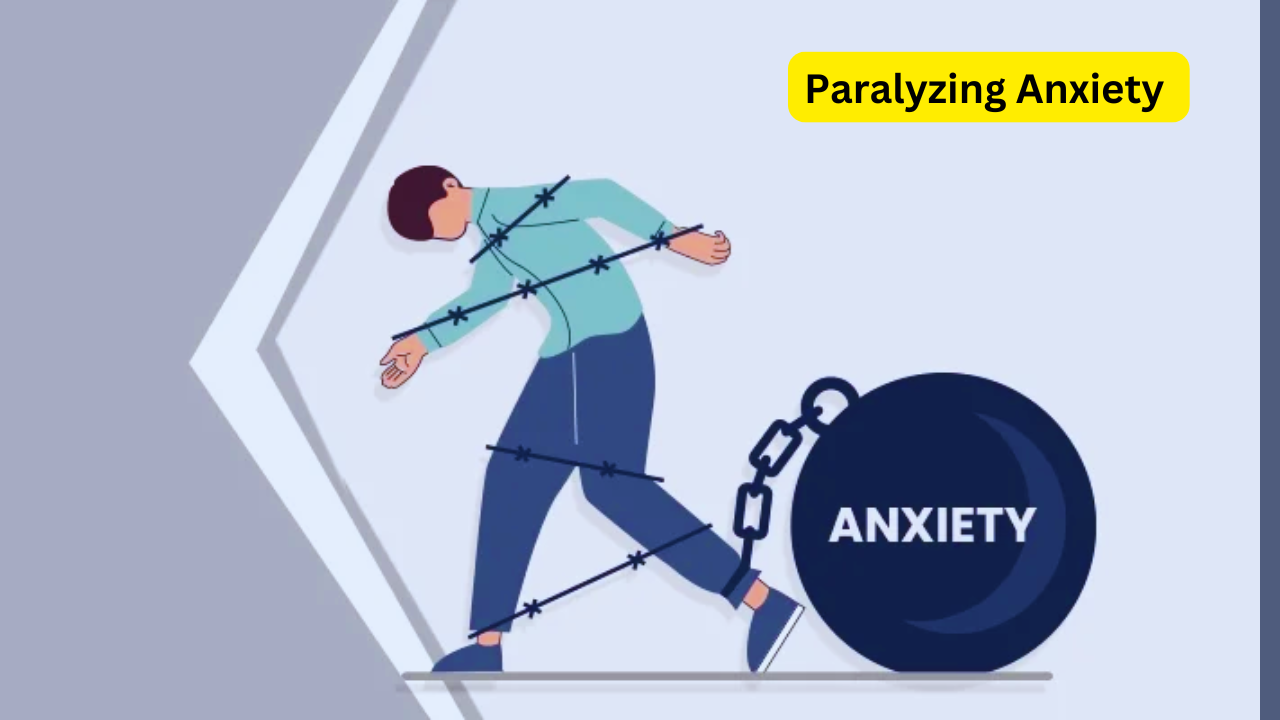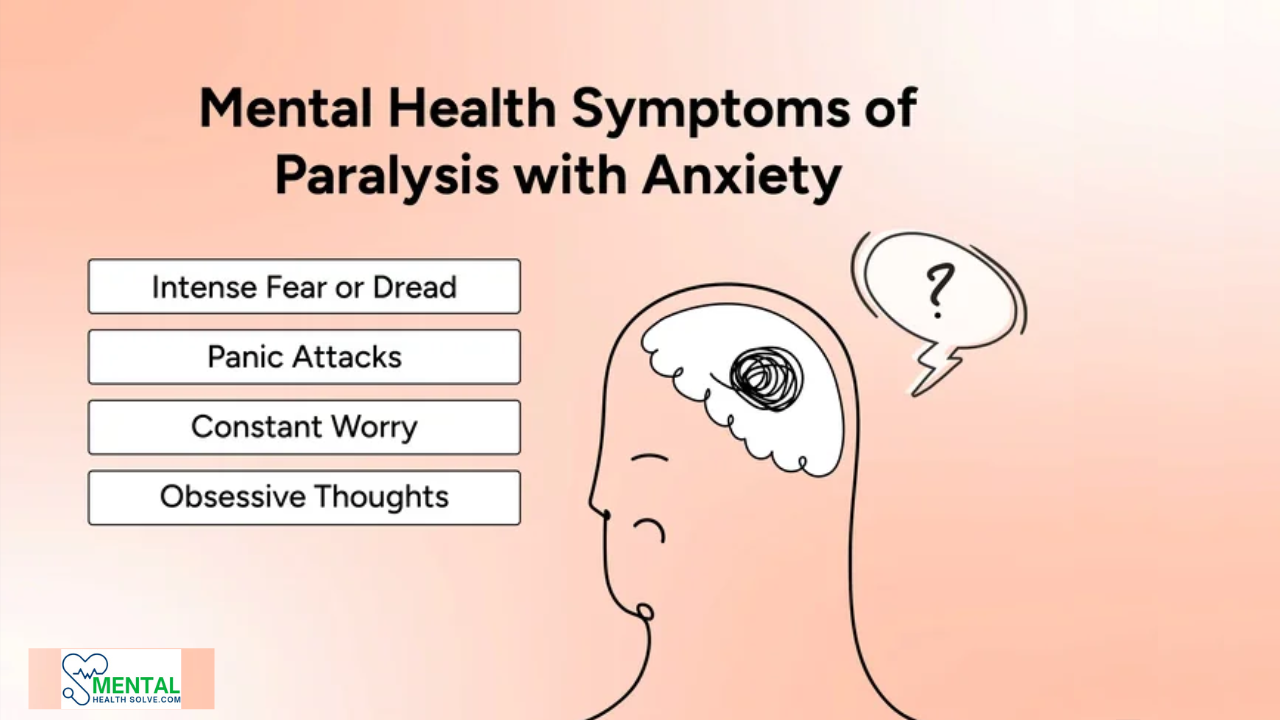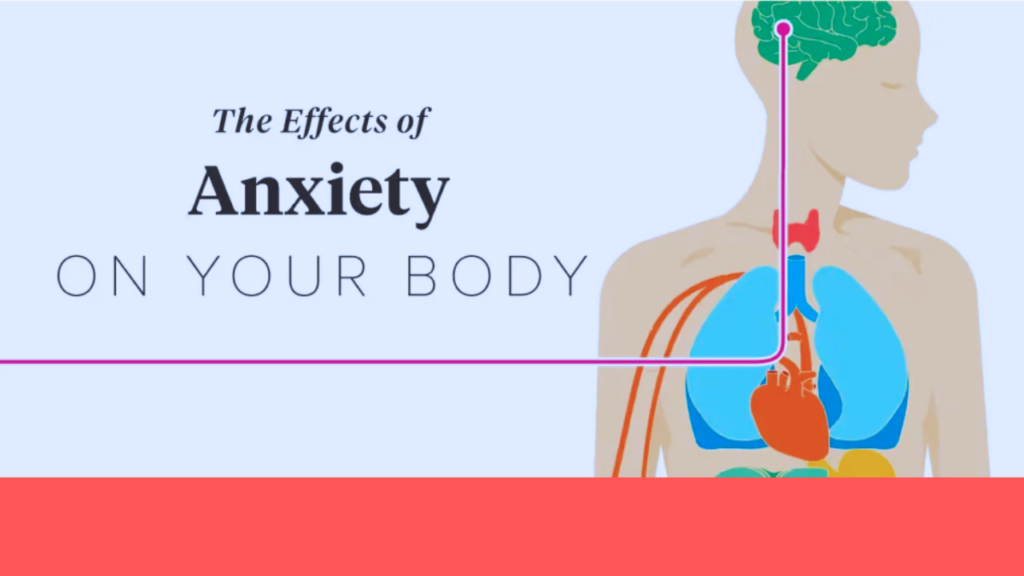
Paralyzing anxiety is a serious type of anxiety that activates the body’s fight-or-flight response, making daily life challenging. While it does not cause physical paralysis, the intense stress, fear, and worry can make it hard for a person to carry out normal activities.
This condition can appear in different ways, including social anxiety, panic attacks, and obsessive-compulsive behaviors (OCD). Paralyzing anxiety can have a serious impact, interfering with personal relationships, work, and school. It often leads to negative self-talk, feelings of isolation, and even depression.
Licensed mental health providers can offer support and treatment to people experiencing paralyzing anxiety. In this article, I will explore the causes of paralyzing anxiety, how it affects people, and how you can treat it.
Key Concepts in Paralyzing Anxiety

Paralyzing anxiety is a severe form of anxiety that can make you feel stuck, and you will be unable to move or respond. It happens because of the body’s natural “freeze” response, part of the fight, flight or freeze survival instinct. This instinct is the body’s way of protecting you, the same as how some creatures pretend to “fake dead” to avoid danger.
Instead of preparing to fight or run, your body shuts off to conserve energy or remain unseen by a perceived threat. Unlike normal nervousness or stress, which can sometimes push you to take action, paralyzing anxiety holds you back and makes it hard to operate in your daily life. The signs of paralyzing anxiety can feel intense and overwhelming, but they do not last forever.
Paralyzing anxiety brings extreme worry and fear that can greatly interfere with daily activities. The triggers and causes of this anxiety disorder can be different for everyone, but understanding them can help in finding ways to manage the disease.
Signs of Paralyzing Anxiety

Paralyzing anxiety, as the name implies, can make a person feel physically “frozen” due to extreme stress or fear. The symptoms can differ in how often they occur and how intense they feel. Below are some common signs of anxiety paralysis.
- Physical Symptoms: Rapid heartbeat, trouble breathing, sweating, or shaking.
- Difficulty Moving: Feeling stuck or unable to respond during moments of intense anxiety.
- Excessive Worrying: Constantly thinking about or obsessing over specific concerns.
- Irritability: Feeling easily annoyed or frustrated, particularly when stressed.
- Avoidance Behavior: Staying away from places or situations that trigger anxiety.
- Overwhelming Fear: Experiencing extreme fear in specific situations.
- Sleep Problems: Having trouble falling asleep or staying asleep because of anxiety.
- Trouble Focusing: Struggling to concentrate or feeling disconnected from reality.
The Causes of Paralyzing Anxiety
Paralyzing anxiety occurs when psychological, biological, and social factors combine with life experiences. It is linked to how the nervous system reacts to danger or stress, sometimes causing a freeze response to a perceived or real threat. Various factors can lead to paralyzing anxiety. They are:
Long-term Stress
Long-term stress can contribute to anxiety disorders, whether it comes from work, personal relationships, or other life situations. Some people may experience panic attacks so intense that they feel unable to move or react. The intense fear can temporarily freeze them, making it hard to react or ask for help instantly.
Genetics and Family History
Research suggests that genetics play a big role in a person’s risk of developing anxiety disorders. The chances may be higher if anxiety or other mental disorders run in the family. Furthermore, research shows that anxiety disorders affect females more often than males.
Nervous System Overload
The nervous system of humans has two main parts that control how they react to different situations. The sympathetic system triggers the “fight or flight” response, while the parasympathetic system helps you calm down. In the paralyzing anxiety condition, both systems turn on at once, causing a “freeze” response that makes you feel stuck.
Substance Abuse
Substance abuse and anxiety disorders are often connected. Some people use substances to manage anxiety, but this can make symptoms worse.
Underlying Health Conditions
Some medications or health conditions might increase anxiety symptoms. For example, medical conditions such as hormonal imbalances, heart disease, and diabetes may trigger anxiety. Talking openly with your doctor is important. They can aid you in understanding the link between your anxiety and physical health and guide you in managing any medical conditions.
Behavioral Conditioning
Anxiety can develop from past experiences where a person learns to react to specific situations with fear. As time passes, this pattern can worsen, leading to panic attacks and paralysis.
Past Traumatic Incidents
Going through trauma, particularly at a young age, can lead to extreme anxiety later in life. These experiences can cause anxiety and fear, which may intensify into paralyzing anxiety when encountering similar circumstances or reminders of the trauma.
What Are The Affects of Paralyzing Anxiety?

Paralyzing anxiety can make daily life feel overwhelming. When the “freeze” response takes over, it can leave a person feeling stuck, emotionally, physically, or mentally. This makes it hard to complete tasks or meet responsibilities. This type of anxiety also often causes avoidant behaviors.
As it creates a strong sense of danger, people might avoid certain situations, tasks, or places even when no real threat exists. Over time, this avoidant behavior can strengthen the anxiety, forming a cycle that makes it even harder to fully engage in life.
Effect on Work or School
Paralyzing anxiety can make it hard to fulfill responsibilities and handle difficulties at school and work. In the workplace, it may affect meeting deadlines, attending job interviews, handling workplace problems, staying focused, or taking on new tasks to advance in a career.
In school, this anxiety can make it difficult to handle presentations or exams, participate in class, finish projects or homework on time, and stay focused on assignments.
Effect on Self-Care
Paralyzing anxiety can make self-care feel overwhelming due to the feeling of being stuck. Simple self-care tasks, such as going outside of the house, sharing emotions, or seeking support, can seem impossible. It can also be hard to stay focused on personal goals or maintain daily routines, such as getting out of bed, maintaining personal hygiene, or eating well.
Effect on Personal Relationships
Paralyzing anxiety can affect your personal relationships by making communication, emotional connection, and problem-solving more difficult. When anxiety causes a feeling of being stuck, it can be hard to actively listen or share feelings with your life partner, leading to frustration and misunderstandings.
Avoidance is a frequent symptom of paralyzing anxiety. This can lead to withdrawing from tough conversations, canceling plans, or abandoning the relationship completely. This type of anxiety can also make it challenging to handle responsibilities or keep commitments.
If a partner doesn’t understand how anxiety affects behavior, they may feel unsupported, ignored, or even rejected. This can create more miscommunication, as anxiety-driven actions might be mistaken for a lack of care.
Effect on Mental Health
Paralyzing anxiety can affect emotional and mental health by making it harder to process and manage emotions. During intense anxiety, your brain prioritizes survival, temporarily shutting down non-essential functions like emotional processing. However, handling emotions is crucial for long-term mental well-being.
When anxiety constantly disrupts this process, it can make stress harder to manage and create a sense of losing control. Over time, this can worsen anxiety and increase the risk of other mental health issues, like burnout or depression.
How Can You Treat Paralyzing Anxiety?
Below, I will give you some treatment options that can help you handle feelings of paralysis caused by anxiety.

Cognitive-behavioral Therapy (CBT)
CBT helps you disconnect anxious emotions from behaviors that make life difficult. For example, it teaches you how to overcome feeling stuck and take action despite anxiety.
Cognitive-behavioral therapy is considered a primary treatment for anxiety and is widely used by mental health professionals. It effectively helps manage conditions like social anxiety disorder, panic disorder, generalized anxiety disorder, post-traumatic stress disorder, and obsessive-compulsive disorder.
Medication
Medications can help manage anxiety by reducing its severity and preventing future anxiety attacks. Benzodiazepines act fast, which makes them useful for short-term relief of anxiety symptoms. However, they are generally not used for long periods because they can lead to tolerance and dependence. Also, you need to use them under strict medical supervision.
For long-term treatment, antidepressants are a better option, but they take a few weeks to start working. These types of medications include tricyclic antidepressants, SNRIs (serotonin-norepinephrine reuptake inhibitors), and SSRIs (selective serotonin reuptake inhibitors).
Closing Remarks
Paralyzing anxiety is a common mental health condition and might affect lots of people worldwide. Although living with anxiety can be difficult, making lifestyle changes and seeking support can help you manage your symptoms and regain control. If you are experiencing paralyzing anxiety, various treatment options are available.
Medication, therapy, and mindfulness exercises can help reduce symptoms. Taking the first step may feel overwhelming, but reaching out for professional help is important for managing anxiety effectively.
